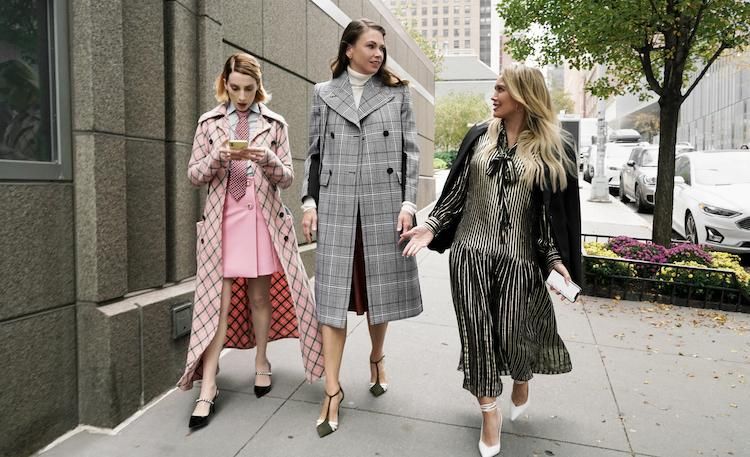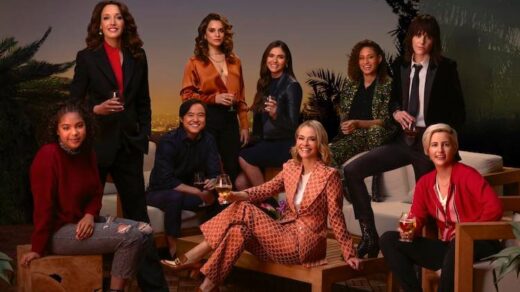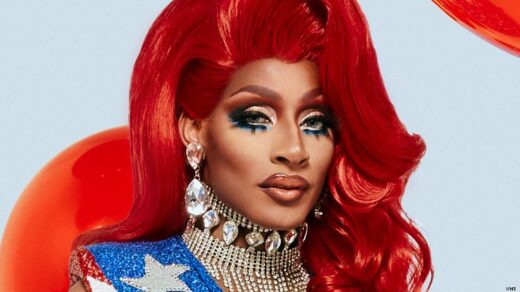Sutton Foster, ‘Younger’ Stars on Queer Rep & Its One True Love Story
Author: Tracy E. Gilchrist

It’s been quite an arc over seven seasons for Younger’s Liza Miller, the latent publishing darling played with youthful exuberance by Tony winner Sutton Foster. When Younger premiered in 2015, Liza was facing a triple-whammy crisis for a woman of a certain age. She was newly divorced, experiencing empty nest syndrome with the daughter she stayed home to raise off to college, and facing ageism and sexism in the publishing industry she’d left nearly 20 years earlier to raise her child. As the story goes, Liza pretends to be a millennial to finally land a job as an assistant to Miriam Shor’s marketing diva Diana at the show’s storied Empirical Press.
Along the journey, Liza lands in Brooklyn with her lesbian best friend, Maggie (Debi Mazar), becomes a publishing powerhouse, comes out about her age, and falls for two irresistible suitors, Josh (Nico Tortorella) and Charles (Peter Hermann). The story of a woman forced to pretend to be young to be viable in the workplace and the will-she-or-won’t-she end up with Josh or Charles have driven much of Younger since it premiered (the series finale is May 6). But in the series rich with LGBTQ+ characters and actors, Foster and creator Darren Star agree that Younger‘s true love story belongs to its women — specifically the deep friendship between Liza and Hilary Duff’s rising millennial-aged editor Kelsey.
“The real romance is between Liza and Kelsey. It’s a romance between two women, two friends. It’s an intergenerational romance about how age is not such a factor in terms of relationships, and how it should be how much we have to learn from each other,” Star tells The Advocate. “It was always important to write that these are characters that always support each other. They had issues, but they had a lot of love for each other. The importance of the relationship sort of superseded the men in their lives sometimes.”
The women from different generations hit it off upon meeting and raise one another up along the way to the top of their field. When Kelsey discovers the secret that Liza has kept from her about her age, there is true heartbreak — not because of the age difference, but because of the betrayal. But Younger is a comedy, so Liza and Kelsey work it out and become stronger for it.
Liza also forms close relationships with other women on the show, including Molly Bernard’s pansexual social media and publicity guru Lauren. She even eventually breaks through Diana’s fabulously icy veneer. Foster concurs that while Liza has the pick of good men between Josh and Charles, those relationships with women on the show are key.
“Younger is a is a romantic comedy, but I feel like the real romance and the real relationships are the female friendships,” Foster says. “It’s women supporting women and women working together and not tearing each other apart to gain ground. It’s optimistic and hopeful.”
Those relationships exist in real life as well, Foster says.
“It’s like that off set as well. We really love one another and support one another. There’s all this respect. And I think that just like bleeds on into the show,” she says. “It’s not a cynical show. It isn’t about tearing each other down. It’s about building each other up.”
Younger doesn’t dabble in cynicism, but Bernard, who is queer and whose role has expanded over the years, agrees that female friendships are at the core of the show. She also leans right into another topic the series tackles.
“Let’s be real, it’s about ageism,” Bernard says. “The premise of the show is that a 40-year-old woman is lying about her age. And each season as our show is going on, there’s another character that finds out and they’re hurt that she lied. And it’s like, ‘Yeah, she lied because she went on all these job interviews because she was a stay-at-home mom for 18 years, tries to get a job, and no one will hire her.’ The second she says she’s a hot 26-year-old they’re like, ‘Well, thank you.’”
“The show highlights a lot of problems and deals with them gracefully,” she adds.
On-screen, Maggie and Lauren are both a part of the LGBTQ+ community, as is Michael Urie’s recurring character Redmond, a book agent. But on-screen, not only are Bernard and Urie in the queer community, Tortorella, who plays the hot tattoo artist and Liza’s on-again, off-again boyfriend Josh, came out as nonbinary during the show’s run, something that was obviously impactful for them, but also for the audience and to their castmates.
“My public journey through queerness really is so intrinsically tied to Younger. In so many ways, playing Josh has been a privilege, right?” Tortorella says. “The world got to know me as this straight white tattoo artist who lives in Brooklyn. Given the other characters and just the fantastical image that Darren creates on television and specifically in New York City, it really allowed me to explore myself in larger ways. I had a larger reach given this show.”
“Because of Josh, I think that navigating these queer conversations publicly was that much more digestible for a multitude of reasons. For that I am forever grateful,” Tortorella says.
In a series of video interviews below, The Advocate chats with several cast members about the LGBTQ+ representation on the show.
Sutton Foster on the Queerness That’s Woven Into the Show
“What was so awesome is that you have characters who are gay. That’s just who they are — part of the fabric. It isn’t this event. Debi Mazar’s character is a lesbian. So it just becomes normalized in a way that I think is really beautiful. And Molly’s character Lauren is blazing a trail of fluidity. Working with Nico, who is like being with somebody who’s a magical unicorn,” Foster says, adding that she learned so much from her young queer castmates as well.
Darren Star on Evolving LGBTQ+ Visibility
The creator of Sex and the City, Star, who is gay, introduced gay characters to TV in the early ’90s when he was an executive producer on Melrose Place.
“It’s always been important to me, from Melrose Place, where we had Matt as a gay character, one of the first gay characters on television. Being gay wasn’t an issue for him. It was just a fact of his life because that’s what reality felt like to me. [You] couldn’t do a show about an apartment building in West Hollywood and not have a gay character,” Star says. “In terms of Younger and dealing with millennial culture, for me, a lot of it was like, Wow, how are millennials identifying themselves, and what are their issues around sexuality? Also, seeing how much a conversation had moved forward.”
Nico Tortorella on All They Gained From the Series
“I don’t know that I would have ever gotten into public publishing and writing if it wasn’t for this show. I don’t know that I would have been so comfortable using my voice on a podcast if it wasn’t for working with Darren Star,” Tortorella says. This show gifted me, in so many ways, my own queerness, at least publicly. And you know, same for Molly. We had our public journeys on this show together. To go to work with other queer actors and queer characters has just been such a blessing.”
Debi Mazar on Queer Rep in the ’80s and Her Inspiration for Maggie
“I had such a great time working with the cast and crew. The character, for me, resonated deeply because it’s someone that I’m not. She’s very different from me. It gave me a few life lessons, and I love being part of the LGBT community, which I’ve always been a part of. I was really happy to be [playing] that person because I come from that,” Mazar says, recalling her days in New York City in the ’80s. “I was advocating for wear a condom [back in the day]. Keith Haring and I and Madonna and multiple friends were always like, you know, ‘No glove, no love.’”
“For me to kind of come to this character and have to portray her, it just felt responsible,” she adds.
Her inspiration for the cool, sex-positive Brooklyn-based lesbian artist Maggie came from her life, Mazar shares.
“I modeled her off of one of my very dear lesbian girlfriends who passed away. May she rest in peace [making the sign of the cross], Yvonne Casas, and she had a loft in Williamsburg that was ginormous — exactly where we shoot [the show],” Mazar says. “I kind of modeled my character off of Yvonne a lot, because she was beautiful. She wore cool fashion, a lot of it from the thrift store, men’s suits. [She was] a little bit femme, she had the best tits you’ve ever seen. And I loved her and her partner.”
Molly Bernard on Normalizing Queer Representation
Bringing visibility to LGBTQ+ people through her work “is probably the part of my job that I take most seriously,” Bernard says. “I think in order to play a queer person successfully, hey, it helps to be one.”
“But I think that queerness kind of can’t be the leading line. It can’t be the headline, right? If the goal is to normalize queer representation in television and film and novels, all storytelling. The least interesting part about Lauren, in my opinion, is that she’s pansexual. It’s also the most exciting and fun part. But it’s not the token part of her, and I think that started early on with the writers, right? In representing how Lauren’s mom, she’s just like, ‘Oh, well, you’re pan.’ Her mom’s totally fine with it,” Bernard says.
“It’s those little moments, you know, as they say, ‘God is in the details.’ It’s those little moments of representation that matter,” she says. “We’re showing a queer person whose parents find Lauren’s love of orange juice more interesting than the fact that she’s pansexual. I just think that’s very cool.”
Peter Hermann on Being a Part of Something Queer and Special
As the staid book publisher Charles among a cast of fabulous women and queer people, Hermann definitely played the “straight man.”
“The opportunity to open that conversation and to be a part of anything that moves the conversation [for] the LGBTQ community in any way is such a fortunate place to be. To take that head on and to just speak about difficult issues is one thing. And deeply valuable,” Hermann says. “But also, to wrap it in this wrapping, in this beautiful, entertaining, shimmery package — to make a contribution that way, those opportunities are really beautiful.”
Hermann goes on to credit the queer characters and cast members, especially Tortorella, for sharing their coming-out.
“And to have watched Nico’s journey from the moment that we met on the show to now is just such a privilege and so extraordinary — a beautiful thing to be a part of,” he says.
Original Article on The Advocate
Author: Tracy E. Gilchrist





